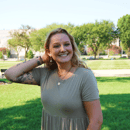Who is Nadia Murad? One of the thousands of women sold into slavery every day.
Why is she important? Because she survived one of the most brutal regimes in modern history and, despite constant threats, calls for peace and justice.
In 2014, Nadia Murad was one of thousands of Yazidis (an ethnic minority in northern Iraq) who were captured by ISIS and forced into sexual slavery. After three months as a sex slave, Murad escaped and was then smuggled out of Iraq and traveled to Germany. In Germany, she was accepted as a refugee. She made it her mission to speak out about how ISIS leadership had created a “religious” rationale to justify the sexual abuse of Yazidi women and girls as young as nine. She spoke at the United Nations (UN) regarding the lack of prosecution or action being taken against ISIS members. Armed with evidence of genocide and slavery, Murad argued that ISIS members must be brought before international court in order to administer justice on behalf of those affected by ISIS and their destructive presence in Iraq.
After her dedicated fight for Yazidis’ rights, Murad was named the UN’s first Goodwill Ambassador for the Dignity of Survivors of Human Trafficking. Murad, along with Dr. Denis Mukwege, a gynecologist from the Democratic Republic of the Congo who treats rape survivors, were named co-recipients of the Nobel Peace Prize. The two were named ambassadors of peace because of their consistent efforts to eliminate the use of sexual violence as a weapon of war. Murad was honored by the committee for her refusal “to remain silent and ashamed of the abuses to which [herself and others] have been subjected.”
Murad is fighting to prevent the use of sexual violence as a weapon of war, for if we do not start to intervene in human rights abuses and violations, then the objectification and weaponization of women and children will continue to proliferate in states of terror. She explains that “we must work together to put an end to genocide, hold accountable those who commit these crimes and achieve justice for the victims.”
In addition to her call on foreign countries to supply support for this international effort, she specifically implores the Iraqi government to rebuild Yazidi towns and villages destroyed by the war against ISIS. The Yazidis are a religious minority from northern Iraq and most of their territory was retaken from ISIS but remains in ruins. The high level of destruction coupled with inadequate security forces on the ground has left tens of thousands of Yazidis displaced in refugee camps and dispersed throughout the Middle East.
Murad describes that peacekeeping efforts are necessary for the rebuilding of Yazidi communities in Iraq: “Without peace, even if we rebuild, life is not possible.” Murad is tackling sexual violence, the war on ISIS, persecution of the religious minority, and is doing so by citing peace as the main vehicle to drive change and progressive movements. Her Noble Peace Prize is a beacon of light to those affected by sexual violence and religious persecution.



